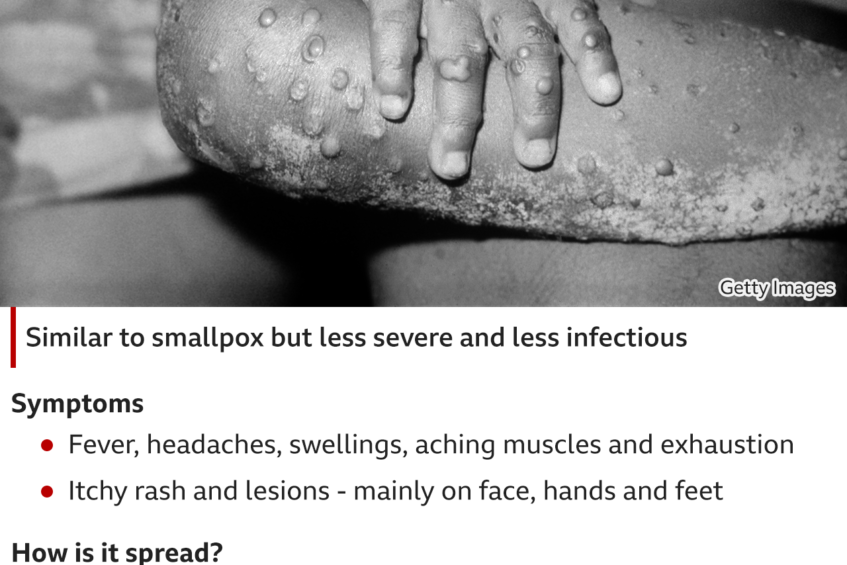You are here: Home | Uncategorized | WHO calls emergency meeting as monkeypox cases cross 100 in Europe

The World Health Organization was due to hold an emergency meeting on Friday to discuss the recent outbreak of monkeypox, a viral infection more common to west and central Africa, after more than 100 cases were confirmed or suspected in Europe.
In what Germany described as the largest-ever outbreak in Europe, cases have now been confirmed in at least five countries – the United Kingdom, Spain Portugal, Germany and Italy – as well as the United States, Canada and Australia.
First identified in monkeys, the disease typically spreads through close contact and has rarely spread outside Africa, so this series of cases has triggered concern.
However, scientists do not expect the outbreak to evolve into a pandemic like COVID-19, given the virus does not spread as easily as SARS-COV-2.
Monkeypox is usually a mild viral illness, characterized by symptoms of fever as well as a distinctive bumpy rash.
“With several confirmed cases in the United Kingdom, Spain and Portugal, this is the largest and most widespread outbreak of monkeypox ever seen in Europe,” said Germany’s armed forces’ medical service, which detected its first case in the country on Friday.
Fabian Leendertz, from the Robert Koch Institute, described the outbreak as an epidemic.
“However it is very unlikely that this epidemic will last long. The cases can be well isolated via contact tracing and there are also drugs and effective vaccines that can be used if necessary,” he said.
There isn’t a specific vaccine for monkeypox, but data shows that vaccines that were used to eradicate smallpox are up to 85% effective against monkeypox, according to the World Health Organisation (WHO).
British authorities on Thursday said they had offered a smallpox vaccine to some healthcare workers and others who may have been exposed to monkeypox.
The WHO committee due to meet is the Strategic and Technical Advisory Group on Infectious Hazards with Pandemic and Epidemic Potential (STAG-IH), which advises WHO on infection risks that could pose a threat to global health.
UNUSUALCASES
Since 1970, monkeypox cases have been reported in 11 African countries. Nigeria has had a large outbreak since 2017 – so far this year there have been 46 suspected cases, of which 15 have since been confirmed, according to the WHO.
The first European case was confirmed on May 7 in an individual who returned to England from Nigeria.
Since then, more than 100 cases have been confirmed outside Africa, according to a tracker by a University of Oxford academic. https://twitter.com/MOUGK/status/1527055553876348928
Many of the cases are not linked to travel to the continent. As a result, the cause of this outbreak is unclear, although health authorities have said that there is potentially some degree of community spread.
In Britain, where 20 cases have been now confirmed, the UK Health Security Agency said the recent cases in the country were predominantly among men who self-identified as gay, bisexual or men who have sex with men.
The 14 cases in Portugal that were all detected in sexual health clinics are also in men who self-identify as gay, bisexual or men who have sex with men.
Health authorities in Spain said 23 new cases were confirmed on Friday, mainly in the Madrid region where most infections were linked to an outbreak in an adult sauna.
It was too early to say if the illness has morphed into a sexually transmitted disease, said Alessio D’Amato, health commissioner of the Lazio region in Italy. Three cases have been reported so far in the country.
Sexual contact, by definition, is close contact, added Stuart Neil, professor of virology at Kings College London.
“The idea that there’s some sort of sexual transmission in this, I think, is a little bit of a stretch,” he said.
Scientists are sequencing the virus from different cases to see if they are linked, the WHO has said. The agency is expected to provide an update soon.
Key facts
Monkeypox is caused by monkeypox virus, a member of the Orthopoxvirus genus in the family Poxviridae.
Monkeypox is a viral zoonotic disease that occurs primarily in tropical rainforest areas of Central and West Africa and is occasionally exported to other regions.
Monkeypox typically presents clinically with fever, rash and swollen lymph nodes and may lead to a range of medical complications.
Monkeypox is usually a self-limited disease with the symptoms lasting from 2 to 4 weeks. Severe cases can occur. In recent times, the case fatality ratio has been around 3-6%.
Monkeypox is transmitted to humans through close contact with an infected person or animal, or with material contaminated with the virus.
Monkeypox virus is transmitted from one person to another by close contact with lesions, body fluids, respiratory droplets and contaminated materials such as bedding.
The clinical presentation of monkeypox resembles that of smallpox, a related orthopoxvirus infection which was declared eradicated worldwide in 1980. Monkeypox is less contagious than smallpox and causes less severe illness.
Vaccines used during the smallpox eradication programme also provided protection against monkeypox. Newer vaccines have been developed of which one has been approved for prevention of monkeypox
An antiviral agent developed for the treatment of smallpox has also been licensed for the treatment of monkeypox.
Support Eye Radio, the first independent radio broadcaster of news, information & entertainment in South Sudan.
Make a monthly or a one off contribution.
Copyright 2024. All rights reserved. Eye Radio is a product of Eye Media Limited.